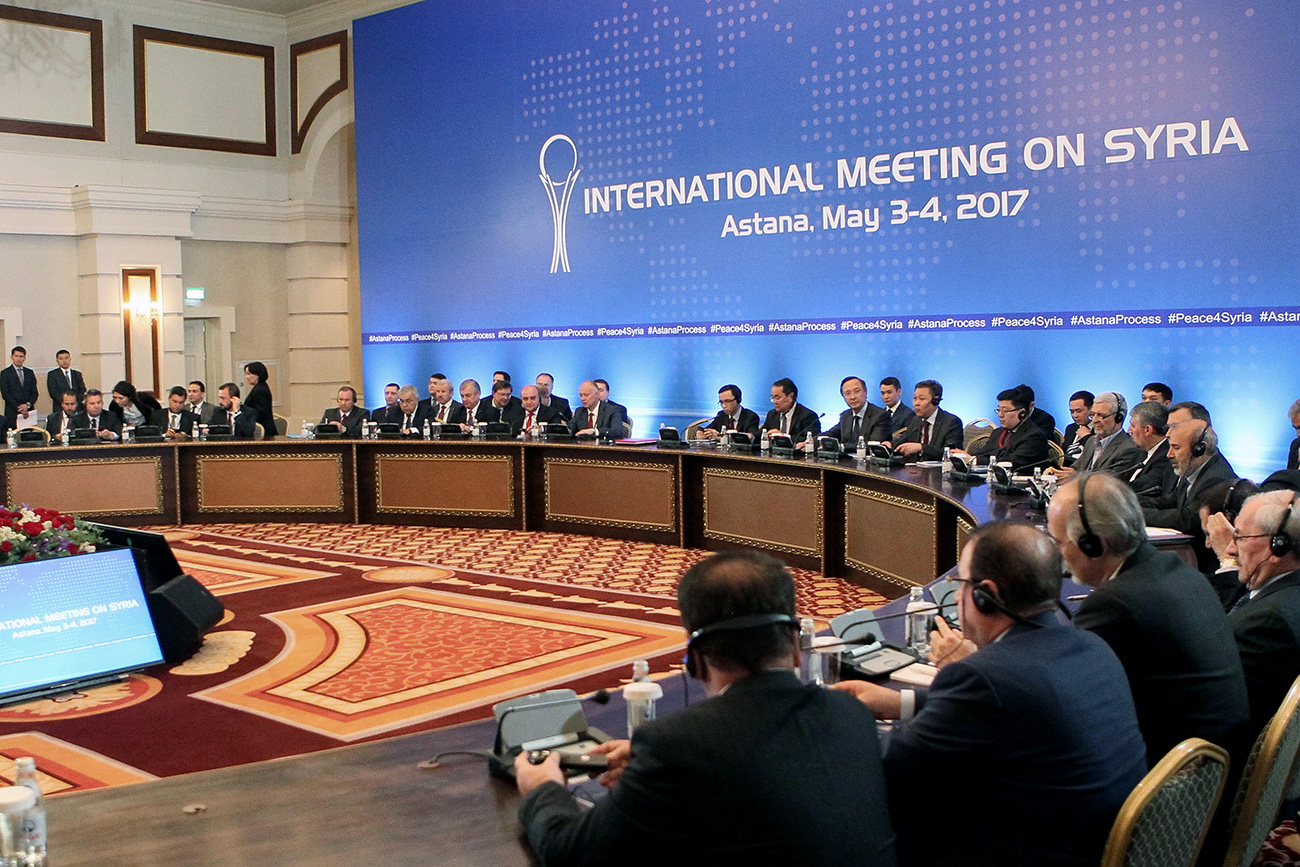
The truce in Syria, established thanks to Russia, Turkey, and Iran’s mediation efforts, has been on shaky ground for the past several months.
AFPDuring talks in Astana on May 3 and 4, Moscow and its partners proposed introducing "de-escalation zones" in Syria which will be monitored by foreign peace-keeping contingents. The truce in Syria, established thanks to Russia, Turkey, and Iran’s mediation efforts, has been on shaky ground for the past several months. For weeks the government forces and the armed opposition have been shelling each other with increasing frequency. The situation escalated further after the chemical attacks in the Idlib Province on April 4, killing 89 people (the government and the opposition blame each other).
In the fourth round of talks in the Kazakh capital, Russia, Turkey, and Iran proposed a completely new regulation plan that foresees the creation of four de-escalation zones, where any use of weapons will be forbidden, the infrastructure will be restored, and conditions will be created for the work of humanitarian organizations. Demarcation lines will be set up on the borders to prevent shelling. The Kremlin explained that the de-escalation zones would also be no-fly zones.
On May 4 in Astana, Russia, Turkey and Iran signed a memorandum to create the de-escalation zones. Representatives of the Bashar al-Assad government expressed their support for the initiative while the opposition delegation opposed it, protesting against Iran's role as guarantor. However, President Vladimir Putin remarked that he had discussed the idea with U.S. President Donald Trump who supported the initiative.
Arab scholar and expert from the Russian International Affairs Council, Sergei Balmasov, believes both the Syrian government and the opposition will not agree to the initiative in practice and will do everything to undermine it. "The idea to create safe zones has been discussed for several years. But the conflict has not been solved and now any agreement, even if it is supported on paper, will be violated," said Balmasov. In his view, the civil war is still at the stage where neither side is prepared to compromise.
On the other hand, if pressure from the mediating troika is strong enough, and it’s supported by Washington and the Persian Gulf countries, the external forces will be able to impose their solution on Damascus and the opposition, believes Leonid Isaev, senior professor at the Political Sciences Department at the Higher School of Economics. "The external players agree on this deal, on these rules of the game. The Syrians are not being asked and it’s understandable. The Syrians have not been able to come to an agreement for many years. That is why now they will have to agree to what others are proposing."
The memorandum foresees the possibility of sending foreign contingents to Syria that will guard the demarcation lines. The document does not specify where the contingents will come from. However, Director of the Center for Islamic Studies at the Institute of Innovational Development Kirill Semenov (in an interview with Svobodnaya Pressa) believes that they can be "neutral international players, such as Malaysia, Indonesia, and the Maghreb countries." Semenov says that the measures enforcing a truce must be harsh and that they must be applied not only to the opposition but also to the government forces. Only then is success possible.
Work to realize the memorandum has only just begun. The Russian delegation says that combat action in the territories indicated in the document will cease on May 6, that the borders of the de-escalation zones still have to be agreed upon, and that some other work also still has to be done. But if the project is implemented, the country will be divided: The government will control certain areas, the opposition others, and between them will be the peacekeepers.
"This will de facto mean a reinforced division of Syria. But actually, Syria has not been united for several years," notes Sergei Balmasov. He adds that neither side of the civil war has any illusions about peaceful co-existence and their participation in the talks in Geneva and Astana is just a façade. Leonid Isaev partially agrees: "Syria as a state exists only on Google Maps, in geography lessons, and on the UN chair nameplate. But de facto the country has collapsed."
At the same time, Isaev says, it’s unlikely that the forces opposing Damascus, whether they are the opposition or the Kurds, are seriously thinking of establishing independent states. This would be too problematic. "These will a priori be failed states. They don't have the resources for independent existence," Isaev says. He believes that this creates the possibility of Syria restoring itself as a state, but at some indefinite point in the distant future.
If using any of Russia Beyond's content, partly or in full, always provide an active hyperlink to the original material.
Subscribe
to our newsletter!
Get the week's best stories straight to your inbox